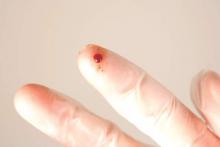Needlestick and sharps injuries are most common among dental residents and obstetrics and gynecology residents, according to Dr. Thomas P. Marnejon and his associates.
During the period from 2000 to 2014 at Mercy Health Youngstown (Ohio), 924 residents were trained, and 129 needlestick and sharps injuries (NSIs) were reported. NSIs were most common during the first year of residency, with frequency decreasing with each year. Nearly 31% of dental residents and nearly 29% of ob.gyn. residents reported an NSI. On the low end were transitional medicine residents (3.3%) and family medicine residents (2.7%).
Injuries to the left hand were nearly twice as common as injuries to the right hand, with left index and left middle finger NSIs accounting for more than 36% of all reported NSIs. NSIs were most commonly caused by suture needles, accounting for 43.4% of injuries; scalpel and blood gas syringe injuries also were common.
No source patients had human immunodeficiency virus, but 16 had hepatitis C, and 1 had hepatitis B; however, no seroconversion in residents was reported.
“For new residents, additional procedural skill simulation using sharp instruments may decrease NSI. However, a majority of residents felt comfortable in procedures with instruments causing injury. Despite resident-reported mastery, caution to avoid both overconfidence and decreased attention to NSI risk is warranted,” the investigators noted.
Find the full research letter in JAMA Internal Medicine (2015 Dec 7. doi: 10.1001/jamainternmed.2015.6828).


